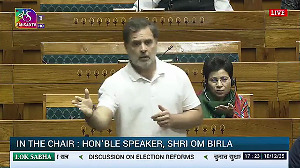 The effective date of the increase in long-term capital gains tax on debt mutual funds is April 1, 2014, with Revenue Secretary Shaktikanta Das on Friday putting a lid on the confusion over the issue.
The effective date of the increase in long-term capital gains tax on debt mutual funds is April 1, 2014, with Revenue Secretary Shaktikanta Das on Friday putting a lid on the confusion over the issue.
The new tax rate "would apply to income arising out of this source in 2014-15, for which the assessment year would be 2015-16," Das told Business Standard, adding that if somebody has already paid advance tax, the Central Board of Direct Taxes would issue a circular to clarify the tax change separately once the Finance Bill is passed.
The confusion arose as the Finance Bill 2014-15 stated that these amendments (doubling the tax rate to 20 per cent) will take effect from April 1, 2015 for the assessment year 2015-16 and subsequent years.
Please click here for the Complete Coverage of Budget 2014 -15
Tax experts earlier said if the new tax was applicable from April 2015, then the assessment year should have been 2016-17.
But the revenue secretary's clarification means that any investments already made in the current financial year would also be impacted by the change.
Investors, who have already redeemed their units, will now have to pay additional tax.
With the Budget prescribing a flat 20 per cent tax rate on redemption, investors who had taken the advantage of 10 per cent without indexation benefit will have to cough up the additional amount.
"If you invest in bank deposits, you have to pay tax depending on your income-tax slab. Most of the people, who invest in debt MFs, are in the 30 per cent bracket."
"This was giving a lot of arbitrage, mainly to corporations and high net-worth individuals."
"But the whole scheme of having a lower tax rate was that mutual funds would have retail investors as primary beneficiaries. However, the percentage of retail investors in debt funds is miniscule. Also, a lot of money which should go into the banking system was coming to mutual funds," Das explained.
Typically, a lot of investors redeem their 13-14 month fixed maturity plans in April-May to take advantage of the double indexation benefit.
That is, an investor gets the inflation indexation benefit of two years by investing for just over a year. According to experts, around 150 schemes were redeemed in April-May 2014. All these investors may have to pay additional tax.
"This would be like a retrospective tax on investors because even after redeeming their units, they would have to pay additional tax," said a tax expert.
The increased tenure from one year to three years is another shocker for the Rs 10-lakh crore mutual fund industry, whose debt offerings have been favoured by investors over traditional bank fixed deposits.
Industry players don't rule out large redemptions in debt schemes if the new norms are applicable to existing schemes. Bond yields have already started hardening, fearing redemptions.
The yield on the 10-year benchmark government bond rose to a high of 8.84 per cent during intra-day trades on Friday, a level last seen on May 20.
It finally ended stable, almost unchanged over the previous day at 8.77 per cent.
"The money being invested with a time frame of 1-3 years will be impacted with some redemptions seen from open-ended funds before this new tax rule comes into effect," said Niranjan Risbood, director (fund research) at Morningstar India.
Among debt schemes, fixed-maturity plans (FMPs), typically preferred by investors for short-term investments, would be the worst-hit, said industry experts. Currently, the assets under FMPs are at an all-time high level of Rs 1.74 lakh crore (Rs 1.74 trillion).
Around 75 per cent of assets in the FMP category have a one-year investment horizon.
Taxed and confused
Capital gains tax rate on debt funds to rise to 20% from 10%
Tenure to claim long-term tax gains raised from 12 months to 36
The confusion that was
Finance Bill says plan effective from April 1, 2015 and will apply to assessment year 2015-16
If it's applicable from April 2015, assessment year should be 2016-17
If assessment year is 2015-16, the move is applicable from April 2014, which means any investments made this fiscal would be covered
Mutual funds' take
If assessment year is 2015-16, such investments will be taxed from the ongoing year, which would be retrospective taxation
Please click here for the Complete Coverage of Budget 2014 -15











